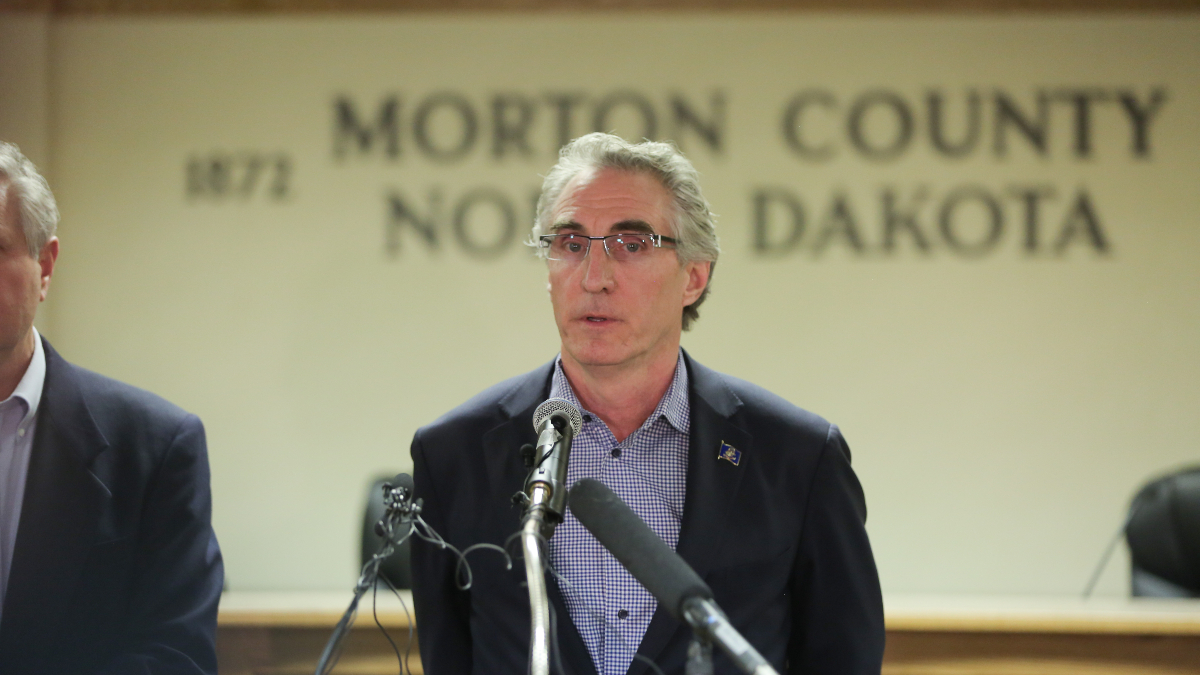North Dakota Legislature Rejects Online Sports Betting Ballot Measure Bill
Stephen Yang/Getty Images. Pictured: North Dakota Governor Doug Burgum.
North Dakota lawmakers again rejected a sports betting ballot measure Monday, likely ending any legalization hopes until at least 2025.
The North Dakota Senate rejected the enacting ballot measure legislation 24-22 last week. It again rejected a reconsideration of the bill 24-23 Monday.
If passed, North Dakota voters could have amended the state constitution’s sports wagering prohibitions via a 2022 ballot referendum.
Republican senators narrowly supported the bill's original vote 20-19, with one member absent. The Senate's seven Democrats voted 5-2 against the proposal.
Republican Sen. Kyle Davison supported the second vote after not voting the first time. Fellow Republicans Sens. Jay Elkin and Michael Wobbema flipped from "no" to yes" on the second vote, but it was not enough to change the vote after GOP Sen. Dave Oehlke and Democratic Minority Leader Joan Heckaman both switched from "yes" to "no" on the second consideration.
The House passed the referendum bill 70-24. North Dakota requires majority votes in both chambers to place a legislature-backed constitutional amendment on the ballot.
Without a 2022 referendum, voters can’t vote on a change until the November 2024 elections, meaning wagering couldn’t come until 2025 at the earliest. Without the enabling ballot measure, a companion 2021 regulatory bill that would allow commercial operators to open up to three online and two retail sportsbooks apiece is also effectively dead.
The Senate’s narrow rejection is the latest blow to North Dakota’s gaming expansion efforts. A separate sports betting bill that would allow the state’s five Native American gaming tribes to open sportsbooks was soundly rejected earlier in the year by the House.
Lawmakers also rejected historic horse racing legislation earlier this session. An online poker bill and companion constitutional amendment are still alive, but still face long odds; the legislature has rejected real money online poker bills in every session since 2005.
North Dakota would have been the least-populated state to approve a sports betting legalization bill. South Dakota, which approved its retail-only sports betting regulation bill last week following a 2020 ballot measure, currently holds that distinction.
Multiple Factions Thwart Sports Betting
Sports betting backers faced an uphill political climb before the Senate vote.
The state limits gambling to the five gaming tribes and certain fraternal and non-profit organizations. Both groups opposed the more expansive statewide mobile sports betting provisions included in the authorization bill, which in turn helped kill the companion constitutional amendment proposal.
North Dakota religious and family groups also spoke out against mobile sports betting, arguing it would drive compulsive gambling. North Dakota University System President Mark Hagerott also testified against the legislation’s college betting provisions, which were later stripped out of the original regulation bill.
These opposition groups helped tank sports betting hopes despite gaming industry support. DraftKings officials testified on the bills’ behalf multiple times, and the American Gaming Association, while taking a neutral position, offered to help support regulated wagering in North Dakota.
Republican Rep. Jim Kasper, a long-time online poker advocate, who helped spearhead the sports betting legislation through the House and testified on its behalf in the Senate. It helped garner the majority party's support in the upper chamber, but it was still not enough to overcome Democratic opposition.
Advocates touted the legislation as a way to protect North Dakota bettors that chose to bet on sports. Though legal wagering would be a comparatively small revenue generator, supporters said a robust, regulated mobile market could help capture untaxed money going to unlicensed bookmakers and offshore sites.
What’s Next?
A citizen-initiated constitutional amendment drive may be legal sports betting’s best hope before lawmakers return for their next scheduled session in 2023. North Dakota law requires citizen-backed petitions to collect verified signatures from 4% of census-counted residents, which is roughly 26,000 people.
If certified, a petition drive could allow a 2022 sports betting ballot question but it remains to be seen if any group will push for it this year or next.
Additionally, any such petition drive faces intrinsic logistical difficulties and costs on top of the political issues that helped thwart sports betting in the legislature. On top of the inherent moral and religious opposition, potential North Dakota sports betting beneficiaries are divided over how legal wagering should be conducted and may not support a petition if they fear it hurts their existing retail gaming options.
The narrow defeat in the legislature could keep sports betting legalization interest alive in the ensuing months, but it must first overcome a myriad of issues to get on the ballot. For now, it appears that won't come until 2024 at the earliest.
How would you rate this article?


